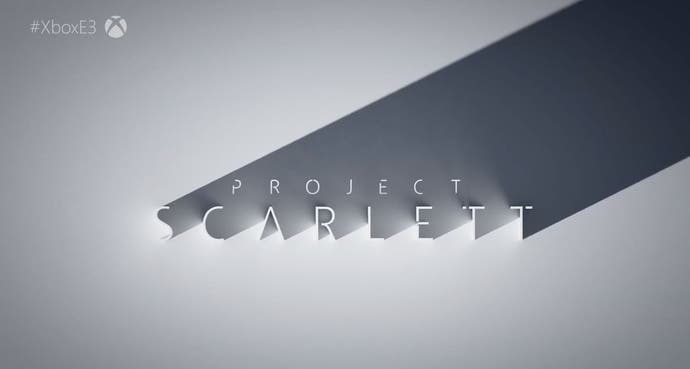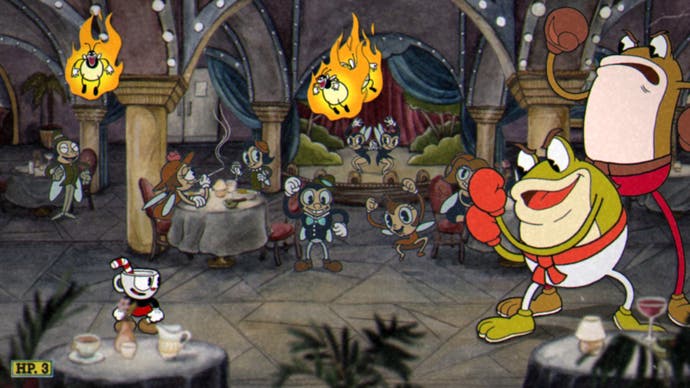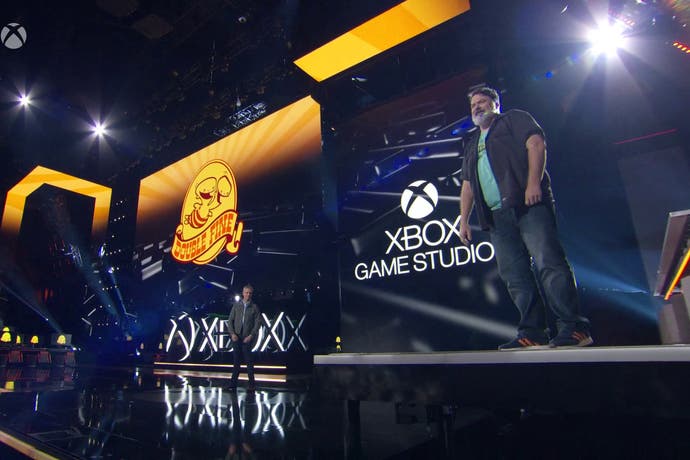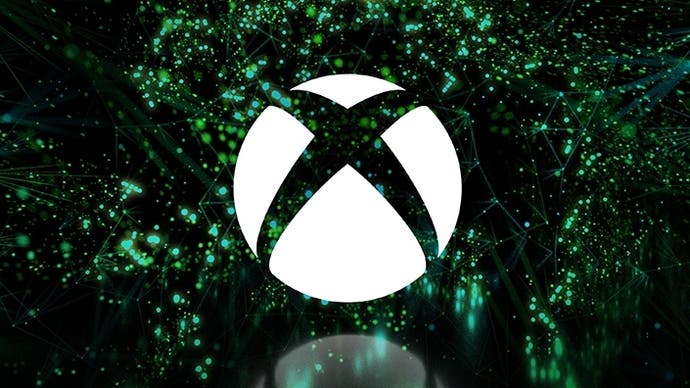Microsoft talks Project Scarlett ID@Xbox plans
Chris Charla discusses consolidation, subscription services and curation.
It's been a few weeks since the Xbox E3 briefing, which has just about given us enough time to calm down from the excitement of Keanu Reeves appearing onstage. The other big news from that conference, of course, surrounded Project Scarlett - Xbox's mysterious next-generation console, which we now know is arriving in Holiday 2020 with Halo Infinite. And we finally got to hear some official specs - although many of the details remain hazy.
Well, we heard a bit about that triple-A title during the briefing, but what about the indies? What does Project Scarlett mean for them?
Inside the bustling Microsoft Theatre during E3 week, I sat down with ID@Xbox senior director Chris Charla to discuss Project Scarlett (as much as we could), along with more general topics such as the impact of subscription services and consolidation on independent developers, and Charla's thoughts on the wider game curation debate.
I thought I'd start off with the exciting news about Project Scarlett - is ID@Xbox going to work the same way next-gen?
Chris Charla: Yeah, absolutely. There's no plans to change it. Our main goal at the start of the program is our main goal now, just to make life easy for indie developers - if we can make life easy for them and make getting onto the platform as easy as possible, then we're gonna have lots of great content, we're gonna have lots of diverse content, and players are gonna be happy. And that won't change at all.
Do indie devs have dev kits yet for Project Scarlett? Or is it too early for that?
Chris Charla: I don't think we're talking about dev kit availability right now. I apologise, I can't really amplify anything that was said about Scarlett more than what Phil talked about onstage.
Do current indies need to do anything to get their games ready for back compat for Scarlett?
Chris Charla: No - one of the things about back compat is it just works. Phil said onstage that every game that plays on Xbox One is going to play on Scarlett, and so we're super excited for that.

What are you looking forward to, in terms of the opportunities offered by Project Scarlett?
Chris Charla: When we're looking at the hardware capabilities, it's really exciting, and I'm really excited about ray tracing - not just for graphics, but for the other things you can do with ray tracing like using ray tracing for collision, and even audio.
Any time I think about what independent developers are doing, I fall into two things - one is, I'm excited for people to just play the awesome games independent developers are doing. One of the cool things about the Xbox Game Pass program we pioneered has been that a lot more independent games are being played by people on the Game Pass - that's super exciting.
But the other thing I'm excited for is the stuff that I have no idea what it is. When we started ID@Xbox in 2013, one of the questions was "what are you most excited about?", and at the time I was said "stuff I can't even imagine". I couldn't imagine Cuphead at the time - that somebody would hand draw all those frames of animation, someone who's never made a game before, to just knock it out of the park with such a tremendous game.
To me, what I'm most excited about when I think about Scarlett... I love the specs, I love new hardware... I can't stop playing with your voice recorder... (edit: he really couldn't) So I do just love the raw technology, but what I really love is the art and seeing independent developers have full creative control and be free from some of the traditional constraints of video game development.

Have you spoken to any indie devs yet about their ideas for Scarlett?
Chris Charla: Not as such - we haven't gone out and said "these are the specs, make something", because we see our role as just telling people what's there, what's available. Because most independent developers are relatively small, they typically don't have research departments or that kind of thing.
We see a lot of sales data and marketing data, so when we do confidential developer conferences, one of the things we do is present that data to developers, in an aggregated and non-identifiable way, so they can make smart market decisions or at least understand where the market's going, or where we see the market going. We do that so developers are armed with information, and the same is true with any new technological or corporate information, something like Game Pass - developers know exactly what's coming up. We want them to know where we see the opportunities, and then we're also really clear to say "if you want to ignore everything we just said, that's cool too."
I do lots of talks with developers at private dev events, and I'll say "look, I'm going to talk today about how we can sell more video games, and how you can present your game best in the marketplace", but we're always clear to caveat by saying "our interests and your interests overlap really neatly in terms of selling copies and making sure consumers can discover and learn about your game".
But there's so many other reasons to make a video game - creative reasons, artistic reasons, personal reasons - and everybody defines success differently. So we try to make that very clear while we present all this information. For example, we'll tell devs the best day to ship is on Friday because then that's a new release over the weekend... but if you want to ignore that, do whatever you want. We're not going to love the game any less, we're not going to support the game any less. When we're looking for games that we want to feature and promote, we're not looking at what's going to sell the best, we're looking at 'what's going to be really exciting? What's going to be interesting? What's going to increase the diverse tapestry of games that are available on the platform?
I guess that feeds quite well into my next question, which is about subscription services and how the games market is changing. There's a worry people won't spend money immediately on an indie if they believe it will later become available on a subscription pass, and that the indie dev will then get a smaller amount of money when it's actually on the pass. What are the financial considerations here?
Chris Charla: I'll caveat it first by saying we don't get into the specific financial agreements, but I can tell you a couple of things. Something that's been a guiding principle since we first started doing Game Pass and working with the Game Pass team - we don't ever want a developer to be in a worse position because they worked with us on Game Pass than if they had not done that. So that is a key tenet for us in the program.
I have heard from some people having questions, and asking 'is this going to hurt my game if I go into Game Pass', and actually I think it's the exact opposite. What we've seen is that folks who are in Game Pass, they spend more time playing games, they play more games, they even buy more games, and that's not just games that are in Game Pass - that's games that are outside of Game Pass.
The really exciting thing for independent developers is that while Game Pass is a great way for players to find their next favourite game, it's also a really great way for developers to find their audiences. Over and over again we hear from devs that discovery and curation are some of the biggest challenges for independent developers today, when we feature a game in Game Pass, that gives an opportunity for millions of people to play that game, and to discover that game, to talk about that game, and it gives a developer an opportunity to have their game seen and experienced. We've seen situations where players will download games in genres we know they've never downloaded a game in that genre before. Play that game, and then go on to purchase games in that genre. So I actually think, for independent developers, Game Pass has been a really great opportunity to find an audience and get people playing the game.
It's really interesting - when we were first doing Game Pass we talked through all these things, as you can imagine as a major new program - 'what could it do, would this happen, would that happen'. We had a pretty good idea what was going to happen, but naturally people were worried. It was pretty gratifying to see it's ended up being a really great win-win for players and developers to have these games on Game Pass.
A more general question is whether you think consolidation and acquiring indies stifles innovation compared to having them on the ID@Xbox program?
Chris Charla: That's a hard question to answer. One of the things that is important for Microsoft, generally, is that developers have a great path getting their games onto Xbox, and in the nicest way we don't mind what that path is. So we have plenty of games that come in as ID@Xbox games or self-published, and three or four months into development, we get an email saying 'oh actually now I'm working with this publisher, I'd like to assign publishing rights to this micro-publisher' who's maybe also an ID@Xbox partner.
Then we also have [situations] where games come into ID and chime with Private Division, or Activision, and then move into the third party publishing realm. We also have games that come into ID as independent games, and then that development studio does a deal with Microsoft and all of a sudden it's a first party game.
From my perspective, and I think from the larger Xbox perspective, that's all cool - the thing that's important is to make it easier for developers to get in, so that players can play those games, and the specific relationship that the game goes through before it ships, is really up to the developer - and we're cool anyway, we've had every situation you can imagine coming through ID, we just try to be really flexible about it.
The argument someone presented in a piece the other day was that when a big company buys a studio, there's suddenly extra requirements for them such as publisher deadlines - do you think this stops developers being weird and creative with their ideas?
Chris Charla: This is a better question for one of the studios that we've acquired, but I think what you find is that studios wouldn't agree to get acquired if they thought their culture was going to have to change dramatically or everything that they loved about making games was suddenly going to go away. Tim joked onstage 'let us know if you want us to work on Excel', and it was clearly a joke, we don't want to have a closer relationship with Double Fine because we want Tim Schafer to work on Excel, we just want Double Fine to be Double Fine. So again, it's a better question for the studios, but we want Ninja Theory to be Ninja Theory.
This time last year, GamesIndustry.biz did a survey which suggested Xbox was the least popular platform amongst indie devs to develop for. I was wondering what you think those reasons are, and what you've been doing over the past year to work on that?
We can't control what developers do, all we can do is focus on ourselves, so we talk to developers all the time. I mentioned earlier that our north star is 'making life easy for developers': I think developers have seen tremendous success - both financial success and creative success on Xbox, and we're always listening to them about how we can make the process easier.

Where do you stand on the debate over curation: for instance, keeping a narrow selection of indies versus broadening choice on a platform?
Chris Charla: Xbox is an open platform, so anyone can ship a game onto Xbox, and it can go at a lot of different levels: you can be a first party studio, you could be a third party studio, you could come in through ID, and then we have the Xbox Creators Program, which lets anyone ship a game onto the platform.
With Creators Program, because that is completely open, we put those games in a special section of the store. For us, consumer empowerment is really important, and it's important for consumers to know these games haven't been curated, they might have different levels of polish, and consumers should know that before they dive in. Other than that, games on Xbox go through concept approval to make sure they're appropriate for a console audience as well as certain bars on console quality.
Ultimately, whether a game is good or bad is something that's going to be determined by players and by the market, but when I do think about curation, I think it's a big reason for the success of Xbox Game Pass - we've worked really hard to curate a collection of 100+ games that are all really solid titles. You may not like every individual title, but I think you can be confident when you're downloading a game on Game Pass, you're downloading a good video game. So it's been exciting to see how that has created an atmosphere where - for people like me, I'm a little bit older, I'm in my 40s - it gives me the freedom to download and try a ton of different games. It brings back that feeling for me, when I was a kid (I'm going to date myself, hardcore) at the video store renting console games, and the freedom to try loads of stuff and the novelty of discovery, without having to make this huge investment.
And because game pass is about $15 (£11.84) a month with Ultimate, it's a pretty fair investment, it gives you access to an enormous amount of high quality curated content and it really does give you that freedom to try lots of different things and find something you love.
Finally, which of the indies that got announced at the briefing are you most excited about?
Chris Charla: One of my favourite moments of the conference was that transition from Keanu Reeves to Spiritfarer, because it was going from this hardcore heavy metal track to a ballad, and when you're making a mixtape (I'm dating myself) or DJ-ing, sometimes you just want to completely change the tone of the music, and that's sort of what we did with that transition and I really loved it.
I'll also say that I typically try not to play games until they're shipped, as I want to just experience them when they're done. I don't like cheating and playing them early. With 12 Minutes I cheated and played a really early version that was fully playable. The gameplay is amazing, the puzzle elements are really well done, the time loops up so you're not constantly doing the same thing but you're always progressing. The emotional impact the game had... I've played plenty of video games and cried at certain points, but I've never played a game and literally had to step away, turn off my computer, and go outside for a walk. It was extremely impactful to me emotionally, I don't know why but that game really hit me - so I'm really excited about that one.



